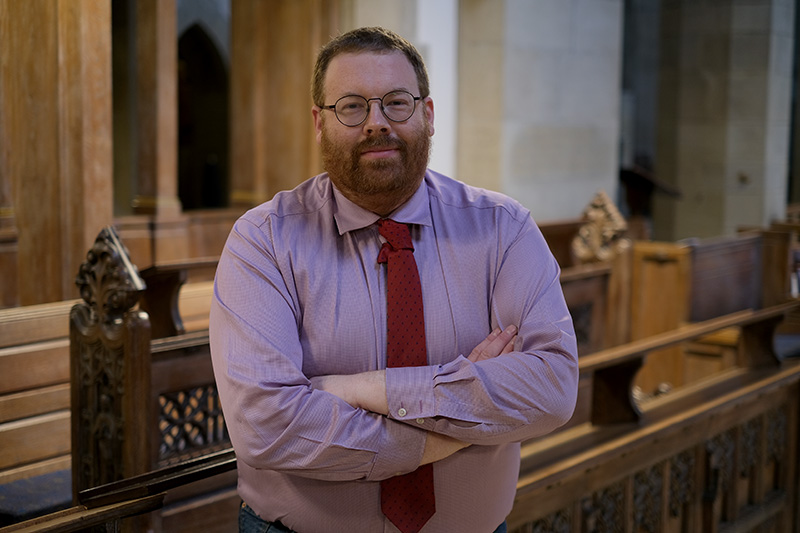On Wednesday 22nd February 2023 we welcome Charles Wooler from Newcastle-upon-Tyne to the Cathedral for our next organ recital of 2023 – and it will include a piece on the Wingfield Organ. In this edition of ‘Notes from an Organist’ we discover what can be found in the underground car park at St Paul’s Cathedral; learning Vierne Symphonies; and creating a programme suitable for Ash Wednesday.
Could you introduce yourself, how you got into music / become an organist and your musical journey to where you are today?
I first started playing the organ at school in Hertfordshire where there was a superb 3 manual Henry Willis III organ in the chapel. By the end of my sixth form I was playing in chapel at least weekly and loved it. When I went to the University of Durham to read Chemistry I continued to indulge my love of church music taking every opportunity to go to the cathedral that I could to hear James Lancelot and Keith Wright play and direct the choir.
I became organ scholar of St Oswald’s Church (under the formidable David Higgins) and spent more time than I ought to have done in the organ loft and less time than I ought to in the labs.
Twenty years ago, I became a Chemistry teacher and promised myself that I wouldn’t let all the progress I had made at the organ wither on the vine, so I developed a sideline as an organ recitalist and have played all over the UK from Truro to Glasgow to Cullercoats on the North East Coast.
What can people expect from your recital at Bradford Cathedral?
I thought long and hard about this programme. Usually, I try and play a healthy proportion of bouncy and upbeat music, especially to close a concert. However, my recital at Bradford falls on Ash Wednesday, which is of course one of the most somber days of the church calendar, and so I have opted to play a more introspective and thought-provoking program than usual.
Why do you enjoy playing the organ?
I love the way that it keeps my brain sharp, forces me to switch off from the day job and allows me to maintain friendships all over the country when I travel around. It’s rare that I feel far from a friendly face when out on the road giving recitals. Getting to know so many wonderful instruments is a privilege and meeting the musicians who play them daily is great fun too. I also love getting to go “backstage” in all the different venues too and seeing the unusual things that few others get to see.
I will never forget standing in the underground car park at St Paul’s Cathedral, marveling at the vast array of “spare” chandeliers which were hanging on racks above the Dean’s sporty little Mazda!
Do you have a particular favourite piece out of those you are playing?
At the moment, I’ve got a particular fondness for the Vierne Symphonies. During the Covid-19 lockdown, I got a little bored and set myself the challenge of learning a Vierne Symphony each year for the next six years. I love the tightly wrought nature of the Third Symphony and the way that it squeezes every last drop out of very economically conceived material. The Intermezzo from that symphony is wonderfully skittish, bordering on the agitated. There’s something uncomfortable about its indecisive and mercurial nature, whilst the Final is a wonderful tour de force. If you enjoy these two movements, then do pop over to Leeds Minster on Friday 24th February at lunchtime when I will be playing the complete symphony.
This recital season we are celebrating music written by female composers. Which piece(s) have you selected, and why did you choose it / them?
Jeanne Demessieux is a composer I have come to know through her performances of other people’s compositions. There is a blindingly good performance of Olivier Messiaen’s Transports de Joie from Liverpool Metropolitan Cathedral when it was brand new. So, I wanted to get to know some of her music and I have opted for two pieces that are based on plainsong chants associated with Passiontide; this being the start of Lent. Hosanna Fillo David is sung on Palm Sunday whilst Ubi Caritas is sung on Maundy Thursday during the washing of feet. Although for the avoidance of doubt, prospective audience members to my recital at Bradford will be reassured to know that my shoes and socks will remain well and truly on!
Are you looking forward to playing the Wingfield Organ, and what will it bring to your set / the piece you’re playing on it?
The Wingfield Organ is remarkable: quite simply it is one of those instruments that tells you how the music should be played – the unequal temperament, the gossamer light action and the particular rattle of the keys add so much to the performance. It’s one of a pair of organs and about 18 months ago, I gave a recital on its larger brother, the Wetheringsett Organ, in Newcastle that included the Byrd Fantasia that I am playing today. So it will be fascinating to hear how the same piece sounds, having got to know it on a different Tudor reconstruction.
What was playing the Byrd piece on the Wetheringsett Organ like?
Terrifying! It has really delicate voicing and a really sensitive touch which means that there is no hiding anywhere with regard to one’s technique. However, all the angst is worth it: it just brings Tudor music alive, freshening it up as if the composer had just brought it to you with the ink still wet on the manuscript.
You’ve played at many places across the country – what’s been the most interesting place you’ve played at, and why?
It would have to be a tie between the recitals I gave at Westminster Cathedral (that Willis organ is simply one of the finest in the country) and Coventry Cathedral, which is phenomenal both architecturally and in terms of the organ. Whilst I’ve never played a recital in Durham Cathedral, I have accompanied many choirs there in services and it is probably my favourite place of all (and not just because the vergers make me tea whilst I practice!)
What was that experience like? Terrifying! It has really delicate voicing and a really sensitive touch which means that there is no hiding anywhere with regard to one’s technique. However, all the angst is worth it- it just brings Tudor music alive, freshening it up as if the composer had just brought it to you with the ink still wet on the manuscript.
Finally, how would you sum up your upcoming recital at Bradford Cathedral?
It’s something I’m really excited about. I have warm memories of my last visit in 2016. The audience is great and the convivial conversation and anecdotes around the buffet table gives a great sense of mutual enjoyment of a shared passion.
You can join us on Wednesday 22nd February at 1pm for Charles Wooler’s organ recital, with an optional £4 buffet lunch beforehand at 12:30pm. You can also find out more about him on his website.
You can discover more about our organ recital season on our dedicated page


Charles, it was wonderful to hear about your life and the progress of your career.
Thank you for reading the piece and we’re glad you enjoyed it!
Charles’ Vierne III at Leeds today was amazing
Thanks for your post – he was such an amazing organist!